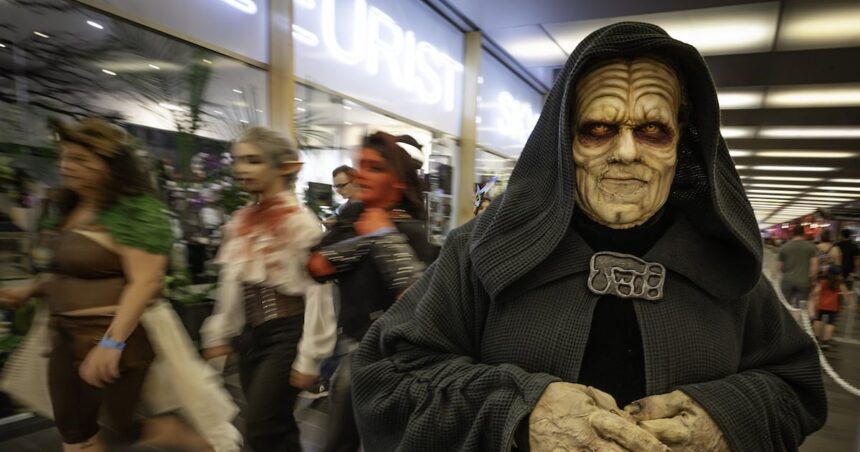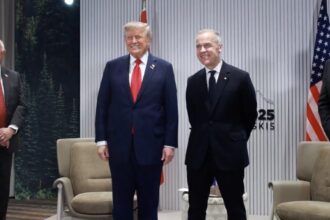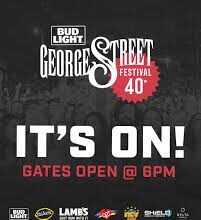The floor of Montreal’s Palais des congrès was a sea of cosplayers, comic enthusiasts, and pop culture aficionados this weekend as Montreal Comiccon 2024 shattered attendance records, welcoming over 65,000 visitors in what organizers are calling their most successful event to date. The impressive turnout comes at an interesting moment, as tensions between Canada and the United States over trade policies create unexpected ripples throughout our cultural industries.
“We’ve never seen numbers like this,” said Elizabeth Coulombe, spokesperson for Montreal Comiccon. “Attendance is up nearly 20 percent from last year, which tells us something significant is happening in the fan community.”
What makes this year’s surge particularly noteworthy is how it stands in contrast to declining attendance at several major U.S. conventions. San Diego Comic-Con, long considered the industry standard, reported a slight dip in attendance for the second consecutive year. The question becomes: is Montreal benefiting from shifting dynamics in North America’s convention circuit?
The answer may lie partially in economics. With the Canadian dollar hovering around 73 cents U.S., American exhibitors, celebrities, and fans find Montreal increasingly attractive. Several American vendors I spoke with at the convention floor mentioned the favorable exchange rate as a primary motivation for making the journey north.
“My booth costs are effectively discounted by nearly 30 percent compared to similar conventions in the States,” explained Marcus Reynolds, a comic art dealer from Boston. “Plus, Montreal crowds are enthusiastic buyers, especially for independent creators.”
This economic advantage exists against a backdrop of growing trade frictions. Recent disputes over softwood lumber, dairy products, and automotive manufacturing have created a chill in Canada-U.S. relations. While comic books and collectibles haven’t been directly targeted by tariffs, the cultural industries aren’t immune to these broader economic currents.
What’s particularly fascinating about Montreal’s convention success is how it reflects a cultural phenomenon that transcends economic considerations. The city has long established itself as a creative hub, blending North American and European sensibilities in a way that creates a distinct flavor for its pop culture gatherings. This year’s programming emphasized this uniqueness, featuring a robust representation of Quebec’s own comic creators, animation studios, and gaming companies.
The local gaming industry had a particularly strong showing this year. Montreal studios like Behaviour Interactive, Eidos-Montréal, and Ubisoft Montreal showcased upcoming titles to enthusiastic crowds. This local connection offers something American conventions often lack – a genuine sense of community ownership that extends beyond mere fandom into genuine cultural pride.
“There’s something special about Montreal conventions,” noted veteran cosplayer Stephanie Chen, who travels to over a dozen events annually across North America. “The bilingual nature of the city creates this fascinating mix of influences you don’t see elsewhere. French-language comics share space with Marvel and DC, anime fans mingle with tabletop gamers – it’s remarkably fluid.”
This cultural fusion extends to celebrity appearances as well. While Hollywood stars drew predictably long lines for autographs, equally impressive crowds gathered for Quebec television personalities and voice actors. The convention’s bilingual programming – panels and events in both French and English – further distinguished it from its American counterparts.
Could this be a model for the future of fan conventions? Perhaps. As global pop culture continues to diversify beyond American-dominated narratives, events that embrace multiple cultural influences may find themselves better positioned for growth. Montreal Comiccon’s success suggests audiences hunger for experiences that balance mainstream entertainment with local cultural touchstones.
The economic implications extend beyond the convention itself. Tourism Montreal estimates the event generated approximately $19 million in economic activity for the city, with hotels reporting near-capacity bookings throughout the weekend. Restaurants, shops, and transportation services all benefited from the influx of visitors, many sporting elaborate costumes that transformed downtown Montreal into a living celebration of imagination.
This economic boost comes at a crucial time. Post-pandemic recovery for event-based businesses has been uneven, with many conventions struggling to return to pre-2020 attendance levels. Montreal’s success offers a potential roadmap for convention organizers elsewhere: embrace local culture, create unique programming that can’t be found at competing events, and foster an environment where multiple fandoms can coexist.
As Canada navigates its complex relationship with its southern neighbor, cultural events like Montreal Comiccon remind us that soft power matters. The ability to create spaces where creativity, commerce, and community intersect represents a form of influence that transcends political tensions.
For now, Montreal can celebrate its position as an ascending star in the convention universe. The question remains whether this year’s record attendance represents a temporary advantage due to economic conditions or the beginning of a more permanent shift in North America’s pop culture landscape. Either way, the success of Montreal Comiccon 2024 demonstrates that in today’s interconnected world, cultural gatherings can thrive even as political relationships grow complicated.
Looking ahead to 2025, organizers have already announced expanded floor space and additional programming tracks. If this year’s success is any indication, they’ll need every square foot they can get.










